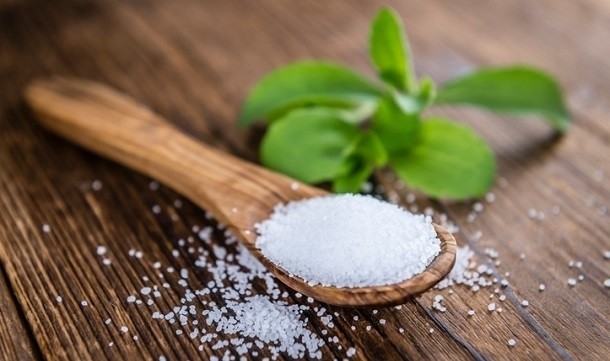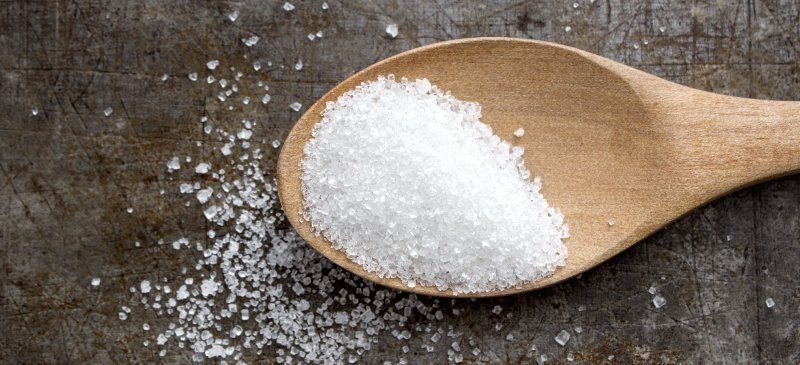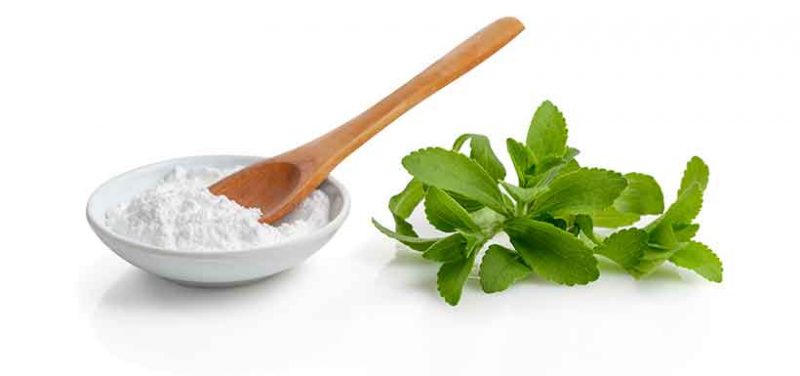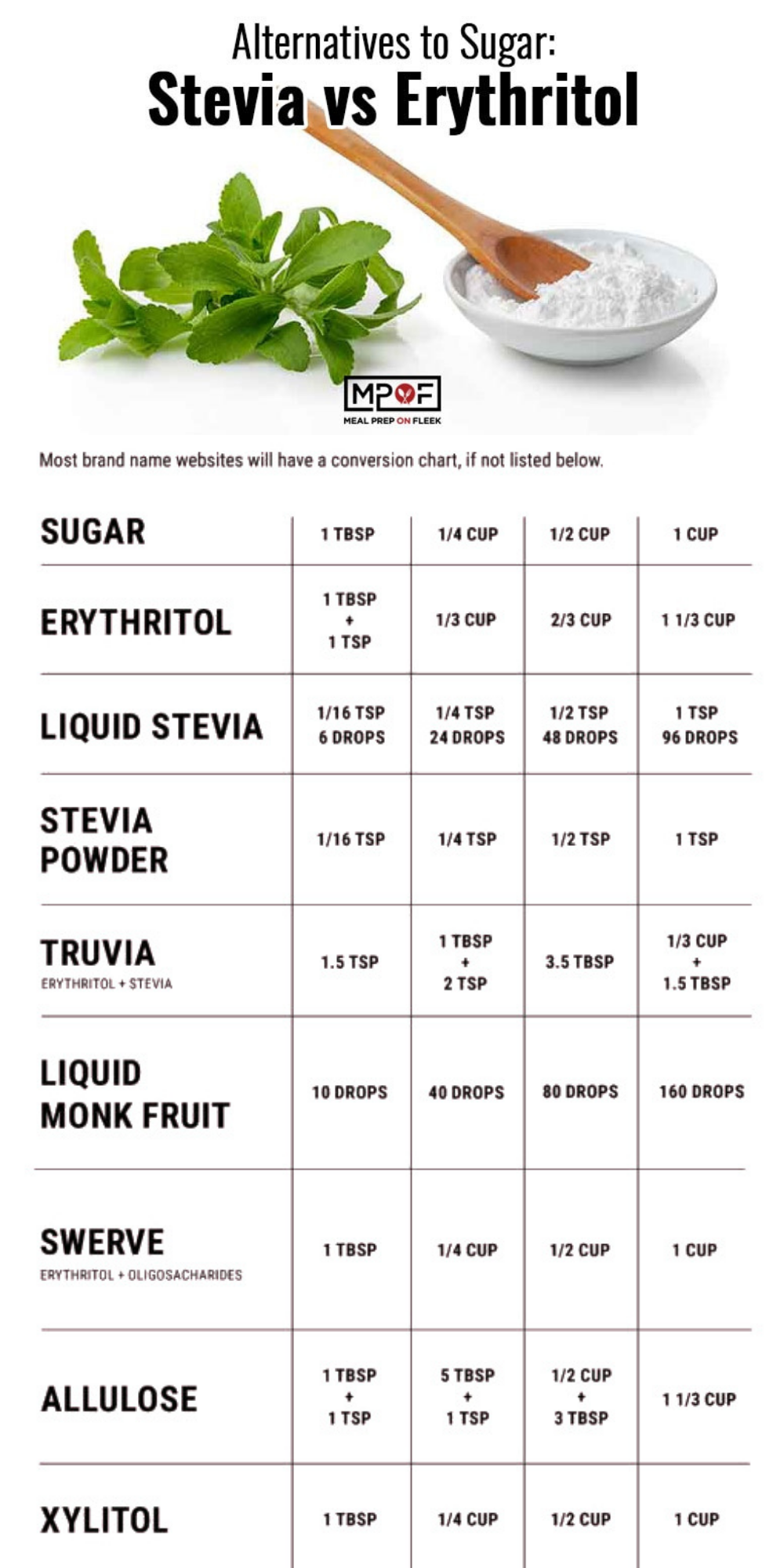Alternatives to Sugar: Stevia vs Erythritol
Sugar is often used generically to describe any sweet-tasting, soluble carbohydrate used mainly for enhancing the taste of food. Sweeteners are derived from various plants, animal and synthetic sources. Consequently, each source serves a different purpose and as such has its own benefits and disadvantages. If you have a sweet tooth, you should be selective about what sweetener is used to create those deliciously sweet treats you enjoy.
Honey from the honey-bee served as one of the earliest forms of sweetener as far back as records provide. However, it was not available in large enough quantities and recent modifications and additions to the substance have decreased its popularity. Thus plant-based replacements were sought and have long since been implemented. Sugar is now utilized in a variety of forms, such as icing, confectionary, powdered, and syrups. Additionally, they may be extracted from fruits, trees and other plants such as coconuts, dates, maple trees, sugar cane stalks, beets and much more.
Such sugars are said to be composed of 50% glucose and 50% fructose. Yet over-consumption of these sugars can lead to mild and serious health issues ranging from tooth decay and obesity to diabetes. Many suggestions have been made to curb this over-consumption of sugar, including a recommendation by the World Health Organization (WHO) that we should only take 5% or less of sugar on a daily basis.
Important:
What is the recent controversy about erythritol and health?
A report published online in Nature Medicine examined clotting risk associated with erythritol blood levels in subjects being assessed for cardiovascular risk.
The same report cited research on 8 healthy subjects fed 30 grams of erythritol and found increased levels of plasma erythritol for about 2 days afterward, well above thresholds associated with heightened platelet reactivity and thrombosis potential in in vitro and animal studies.
The amount of erythritol used in NOW’s Monk Fruit products is less than one gram per packet; and 8 grams per 2-tablespoon serving of our Monk Fruit 1:1 Sugar Replacement Organic product.
The recent study that generated controversy about erythritol stated:
“In summary, the present studies suggest that trials investigating the impact of erythritol specifically, and artificial sweeteners in general, with appropriate duration of follow-up for clinically relevant outcomes, are needed. Following exposure to dietary erythritol, a prolonged period of potentially heightened thrombotic risk may occur. This is of concern given that the very subjects for whom artificial sweeteners are marketed (patients with diabetes, obesity, history of CVD and impaired kidney function) are those typically at higher risk for future CVD events.”
The authors also report, “Another limitation of our clinical observational studies is that by design, these studies can only show association and not causation.”
That said, people who have diabetes, obesity, cardiovascular disease, or kidney disorders should consult with their physicians regarding whether erythritol is advisable for their use. In addition, consult a physician about whether erythritol can be used at the same time as anticoagulant/anticlotting/“blood thinning” medications, the use of which are intended to counter clotting factors.
Read more here: NOW Foods
Sweetener Conversion Chart Below
Don’t think this is an attempt to kill your sweet tooth and crush your dreams of using sugar! Not at all. Presenting…. drum roll, please…. stevia and erythritol. These two healthy plant substitutes make having your cake and eating it possible! Having introduced these alternatives to sugar let’s have a closer look at their similarities and differences.

Alternatives to Sugar - Origin
The indigenous people in Paraguay and Brazil have, for so many years now, consumed stevia by chewing on the leaves of the plant. The sweetness comes from its leaves, which can be ingested as is or dried and steeped in hot water, like tea. Stevia, a plant-based alternative to sugar, is extracted from the leaves of Stevia Rebaudiana (from sunflower family), a plant found in South America. As such it is cultivated in large quantities primarily in Brazil, Paraguay, Japan, and China.
However, in the United States, commercial and marketing of natural leaves are not allowed. Therefore, to meet the regulatory requirements of FDA, stevia needed to undergo a filtering process to achieve concentration and purity. As a result of these manufacturing processes, stevia is available in the form of powder, granulated or suspended in liquid.
Though Erythritol is also extracted from the leaves of a plant, it is classified as sugar alcohol due to its chemical nature. Erythritol is derived through the process of fermentation, similar to the wine and liquor creating process. It is, therefore, a by-product of the fermentation process. Commonly used plants in extracting erythritol for commercial purposes are corn and birch. Erythritol is available in granulated form.

Alternatives to Sugar - CALORIE AND SWEETNESS LEVEL
Are you on a special low-carb diet? How about the Keto diet? Guess what! Both are suitable for low-carb diets, including the Keto diet as they have zero calories. Meaning, there is no need for you to worry about adding additional pounds when you use either stevia or erythritol with your food. The level of sweetness alone reduces your intake as stevia is already over 200 times sweeter than sugar.
Yet there’s no need to worry about our health because as a rebaudioside it cannot be absorbed by the body thus negating any negative setbacks. Careful, commercially-manufactured stevia might have other ingredients that might contribute to the additional calories per serving. Similarly, Erythritol is 60-80% sweeter than sugar, and it is not completely absorbed by the body so there is a limited effect on blood sugar levels. Five grams of erythritol is equivalent to one calorie.
Consider the table below for the sweetness and caloric differences between the two:
| Type of Sweetener / Classification | Calories/Gram | Sweetness Index | Glycemic Index | Calories/Spoon Equivalent |
| Erythritol / Sugar Alcohol | 0.2 | 0.65 | 1 | 1 |
| Stevia / Natural Zero Calorie Sweetener | 0 | 300 | 0 | 0 |
Source: http://www.sugar-and-sweetener-guide.com/sweetener-values.html

Alternatives to Sugar - HEALTH BENEFITS
It’s always important to consider the health benefits. Here are some health tips we’ve selected for you:
- Both stevia and erythritol have no calories, no carbs, and you guessed it, no sugar. Also, they do not raise blood glucose levels and can still taste great.
- They are an excellent alternative to sugar as they are both low in carbs.
- Additionally, erythritol can reduce the absorption of fructose, which usually leads to metabolic disorders. Its antioxidant properties can assist in removing free radicals in the bloodstream.
- Meanwhile, stevia has other properties that are anti-microbial, anti-fungal, anti-tumor, anti-oxidant, and anti-diabetic.
However, we must also take into consideration that taking too much stevia or erythritol can also pose some health problems.
- Erythritol can cause gastrointestinal discomfort such as bloating, gas build-up, and diarrhea if used excessively since it is only absorbed partially by the intestinal tract.
- One study showed that excessive stevia is associated with increased insulin secretion and there is a possibility of increased fat storage and metabolic issues.
- Some people have experienced headaches and allergies when taking stevia.
To determine the amount of stevia or erythritol that we need to consume on a daily basis, World Health Organization (WHO) recommends a limit of 1.8 milligrams of stevia per pound per day. However, WHO didn’t set a limit for erythritol because of the relatively limited risks associated with its use.
Alternatives to Sugar - USES IN FOOD PREPARATION
Stevia and erythritol can both be used as an alternative to table sugar. However, there are certain things that have to be considered before using them in cooking.
- The granulated form of erythritol or stevia might cause problems when used in baking. They tend to take longer to dissolve. To overcome this hurdle, the powdered form of erythritol or liquid stevia is recommended.
- Since erythritol has 60-80% sweetness level compared to table sugar, it is recommended that the amount of sugar to be used must be increased, about 1.3 times more. For stevia, it is recommended to know the concentration level first before converting it into sugar. As it comes in a variety of forms for commercial use stevia is more difficult to use in cooking. Important to note that, stevia does not work well with ingredients that are naturally bitter, like dark chocolate as it amplifies the bitter taste.
- Erythritol and stevia might both have a sweet taste, but their actual taste is far from the taste of table sugar. As mentioned above, some people might find stevia having a bitter taste. Erythritol, on the other hand, doesn’t have the same mouth sensation as table sugar, as it provides a cooling sensation in the mouth.
These conversions in the chart below may prove to be a useful guide for your meal preparations:
Source: https://www.wholesomeyum.com/natural-low-carb-sweeteners-guide-conversion-chart/
Want to try using stevia or erythritol in your meal prep recipes? Try our Cinnamon Roll Muffin recipe and Stuffed French Toast at home! Take note of the measurements used on the recipe, kindly refer to the converter above to get the exact amount needed for your next meal prep creation.
Alternative Sweetener Conversion Chart:
| SUGAR | 1 TSP | 1 TBSP | ¼ CUP | ⅓ CUP | ½ CUP | 1 CUP |
|---|---|---|---|---|---|---|
| Besti Monk Fruit Allulose Blend | 1 tsp | 1 Tbsp | ¼ cup | ⅓ cup | ½ cup | 1 cup |
| Besti Monk Fruit Erythritol Blend | 1 tsp | 1 Tbsp | ¼ cup | ⅓ cup | ½ cup | 1 cup |
| Be Erythritol | 1 ¼ tsp | 1 tablespoon + 1 tsp | ⅓ cup | ⅓ cup + 2 Tbsp | ⅔ cup | 1 ⅓ cup |
| Besti Allulose | 1 ¼ tsp | 1 tablespoon + 1 tsp | ⅓ cup | ⅓ cup + 2 Tbsp | ⅔ cup | 1 ⅓ cup |
| Erythritol (any brand) | 1 ¼ tsp | 1 tablespoon + 1 tsp | ⅓ cup | ⅓ cup + 2 Tbsp | ⅔ cup | 1 ⅓ cup |
| Allulose (any brand) | 1 ¼ tsp | 1 tablespoon + 1 tsp | ⅓ cup | ⅓ cup + 2 Tbsp | ⅔ cup | 1 ⅓ cup |
| Xylitol (any brand) | 1 tsp | 1 Tbsp | ¼ cup | ⅓ cup | ½ cup | 1 cup |
| Just Like Sugar Table Top | 1 tsp | 1 Tbsp | ¼ cup | ⅓ cup | ½ cup | 1 cup |
| Lakanto Monkfruit Sweetener | 1 tsp | 1 Tbsp | ¼ cup | ⅓ cup | ½ cup | 1 cup |
| MonkSweet Plus | ½ tsp | 1 ½ tsp | 2 Tbsp | 2 tablespoon + 2 tsp | ¼ cup | ½ cup |
| NuNaturals NuStevia Stevia Extract | - | - | 3/16 tsp | ¼ tsp | ⅜ tsp | ¾ tsp |
| Natural Mate All-Purpose Blend | ⅜ tsp | 1 ⅛ tsp | 1 tablespoon + 1 ½ tsp | 2 Tbsp | 3 Tbsp | 6 Tbsp |
| NuNaturals NuStevia Liquid Stevia | ⅜ tsp | ⅜ tsp | 1 ½ tsp | 2 tsp | 3 tsp | 2 Tbsp |
| Pure Monk | - | - | ⅙ tsp | ¼ tsp | ⅓ tsp | ⅔ tsp |
| Pyure All-Purpose Blend | ½ tsp | 1 ½ tsp | 2 Tbsp | 2 tablespoon + 2 tsp | ¼ cup | ½ cup |
| Sukrin:1 | 1 tsp | 1 Tbsp | ¼ cup | ⅓ cup | ½ cup | 1 cup |
| Swanson Purelo Lo Han Sweetener | - | ¼ tsp | ¾ tsp | 1 tsp | 1/12 tsp | 3 tsp |
| SweetLeaf Sweet Drops Liquid Stevia | - | ⅛ tsp | ½ tsp | ⅔ tsp | 1 tsp | 2 tsp |
| Swerve | 1 tsp | 1 Tbsp | ¼ cup | ⅓ cup | ½ cup | 1 cup |
| THM Sweet Blend | - | ½ tsp | 2 tsp | 1 Tbsp | 1 tablespoon +2 tsp | 3 Tbsp |
| THM Gentle Sweet | ⅓ tsp | 1 tsp | 1 tablespoon + 1 tsp | 2 Tbsp | 3 tablespoon + 1 tsp | 6 Tbsp |
| Truvia Spoonable | ½ tsp | 1 ¼ tsp | 1 tablespoon + 2 tsp | 2 tablespoon + 1 tsp | 3 ½ Tbsp | ⅓ + 1 ½ Tbsp |


Debra says
not very helpful....I wanted to know the measurement between stevia and erythritol. I have a recipe that requires 1.5 cups erythritol and would like to know how much stevia instead as a substitute.
Meal Prep on Fleek says
Hey Debra - Thank you for the comment! We added a ration chart to help with conversions/swaps
Amanda says
No, I was looking for the conversion of liquid drops of Stevia to granulated erythritol
Ana says
I think the article says 6 drops of stevia equal 1 tbsp+1 tsp of erythritol or 1 tbsp of sugar.
Denise Galiano says
I am having awful gas issues with the erythrorol. Any suggestions on what to use? I guess I'm using to much but would like to be able eat desserts and use when needed in cooking.
Sarah Kesseli says
Hi Denise,
Monk fruit sweetener is another option. There are no gassy side effects or weird after tastes!
Girish Tiwari says
This comparison is useful!
Doug says
Hi,
I use Sweetleaf Sweet Drops (liquid Stevia). I’m trying to find out if it contains Erythritol since there was a new study published that may correlate Erythritol with blood clotting issues. When I look on the bottle is Sweet Drops I see a few ingredients named and then “natural flavors”, same on their website. I’m wondering if natural flavors could be Erythritol.
Thanks!
Carrie Havranek says
Hi Doug! My best educated guess is that there is no erythritol in that product because stevia is the main ingredient for the sweetener and it would not make sense to call it a "natural flavor" since it's primarily used as a sweetener. But I'd contact the manufacturer to be 100 percent sure and put your mind at ease. I often have good luck using a company's Instagram or Facebook page, a company web site chat feature, or a good old-fashioned 800 number if there is one to be found. Good luck, and thanks for the question!